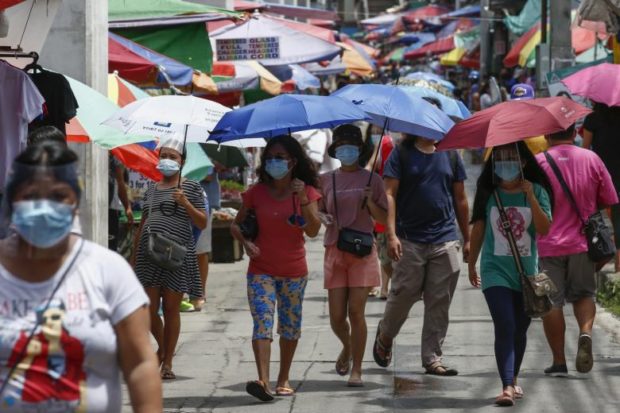Spread of COVID-19 in Manila slowing down, but Philippines not out of the woods yet—experts

A sidewalk lined with vendors in Quezon City on Sept 1, 2020. EPA-EFE via The Straits Times/Asia News Network
MANILA, Philippines — Six months after enforcing some of the world’s longest and strictest quarantine restrictions, the Philippines is seeing signs that the Covid-19 outbreak in its capital Manila is finally being contained.
“We’ve actually flattened (the curve),” Professor Guido David, head of the University of the Philippines’ Octa Research Team, told CNN Philippines on Sunday (Sept 6).
He was referring to indications that the spread of the coronavirus was slowing down.
And though the same number of people might be getting sick, infections appear to be happening over a longer span of time, allowing hospitals time and resources to treat incoming Covid-19 patients without getting overwhelmed.
Prof David said the reproduction number of the virus in the capital, which saw the highest number of infections, had fallen to less than one and was decreasing, calling this “a good sign”.
Article continues after this advertisementThe reproduction number is an indicator of how contagious a disease is, or how easily it spreads from person to person in a community. Governments use it as a proxy for determining whether their respective Covid-19 outbreaks are growing, shrinking or holding steady.
Article continues after this advertisementGenerally, a figure lower than one is a good sign.
Prof David said the so-called positivity rate was also going down.
“We were averaging more than 4,000 cases (a day) from mid- to late-August (for the whole county). Now, we’re averaging 3,000,” he said.
Health officials recorded more than 130,000 infections in August, which represent more than a third of the country’s recorded tally of 237,365.
The Philippines still has the highest number of recorded Covid-19 cases in South-east Asia. About 48,000 are still active cases.
About 17,000 new Covid-19 cases have been recorded so far in September.
Health Undersecretary Maria Rosario Vergeire said on Monday that while current indicators showed improvements, “we always say nothing is certain at this point”.
“We can say that our strategies are working, although it’s not immediate. We can see that we are decongesting our hospitals,” she said.
Dr Vergeire disclosed that only 66 percent of hospital beds in Manila were occupied, from a high of about 80 per cent last month.
Prof David said the two-week lockdown early last month was a “big factor” for the declining numbers.
President Rodrigo Duterte reimposed quarantine measures in the capital and four nearby provinces – home to some 27 million or a quarter of the Philippine population – from Aug 4 to 18 after more than 160 medical groups warned that the health system was on the verge of collapsing.
The Philippines went through one of the longest shelter-at-home lockdowns in the world from mid-March to May. But since emerging from that sweeping lockdown on June 1, confirmed infections in the country had surged past 200,000.
Now, curbs have been eased once again.
Most businesses, including dine-in services, have been allowed to resume. Religious services are also back, provided that houses of worship limit total attendance to 30 per cent of a building’s capacity.
Operating hours for malls have been extended.
Fitness gyms, barber shops and Internet cafes were allowed to reopen partly – at 30 percent of their capacity .
Prof David said it was too early to rule out another surge.
“It doesn’t mean our problem is solved. It doesn’t mean the pandemic is over,” he said.
“The virus is still here. We’re still getting around 3,000 cases per day and we have to sustain our momentum. So we have to keep doing the right things and not falter.”
He said Covid-19 cases in the Philippines could still cross 300,000 by the end of the month.
For more news about the novel coronavirus click here.
What you need to know about Coronavirus.
For more information on COVID-19, call the DOH Hotline: (02) 86517800 local 1149/1150.
The Inquirer Foundation supports our healthcare frontliners and is still accepting cash donations to be deposited at Banco de Oro (BDO) current account #007960018860 or donate through PayMaya using this link.